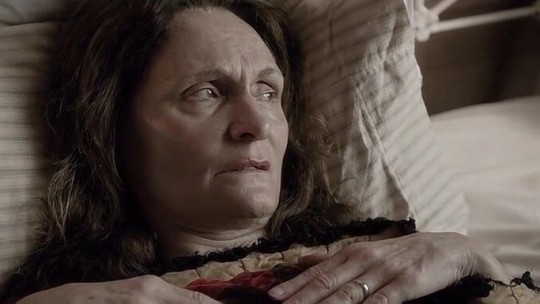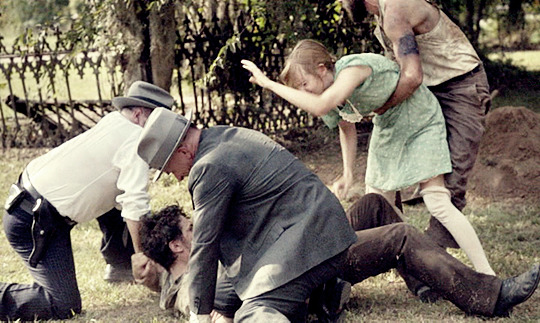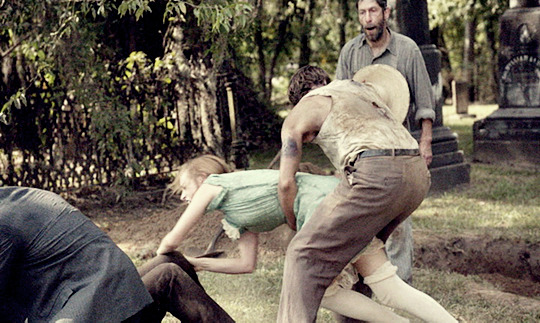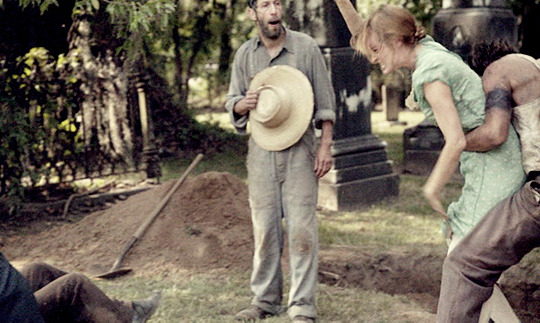#dewey dell bundren
Text
ROUND 2: SPACE CORE (portal 2) VS DEWEY DELL WITH A KNIFE (as i lay dying if it was good)


#dewey dell u are about to die but at least u killed anse first#space core#portal 2#portal#dewey dell bundren#as i lay dying#classic lit#southern gothic#tournament#now kill#c2
180 notes
·
View notes
Text

#lit#I’m being Fine and Normal 👍🏼#Shiv roy#antigone#ophelia#sofya semyonovna#Cordelia#everythings fine it’s fine#Literature#Dark academia#??#I might be a little too silly for dark academia but w/e#12th grade ap lit#Succession#hamlet#crime and punishment#King lear#Dewey dell bundren#As I lay dying
17 notes
·
View notes
Text
As I Lay Dying by William Faulkner - Notes + Thoughts
Main Themes: death + grief, classism, individual agency, religion
Images + Symbolism: bananas, buzzards, cows/horses/steer, eggs, rain/water - change, "queer" in reference to Darl's behavior/demeanor
Classism:
Dewey Dell: "I had saved enough so that the flour and the sugar and the stove wood would not be costing anything." (pg. 7)
"'But those rich town ladies can change their minds. Poor folks cant."(pg. 7)
Dewey Dell experiences the class divide starkly after painstakingly saving for the ingredients for a cake - which she cannot sell because the customer, "change[d] their minds" which is privileged
Darl: " Without looking back the horse kicks at him, slamming a single hoof into the wall with a pistol-like report. Jewel kicks him in the stomach"(pg. 13)
Darl works his horse like he is worked, especially by Anse who believes he should own what his children own - violence seems to somehow communicate respect, maybe the respect of handling physical responsibilities
"I have never seen a sweat stain on his shirt. He was sick once from working in the sun when he was twenty-two years old, and he tells people that if he ever sweats we will die."(pg. 17)
Dewey Dell: "We are country people, not as good as town people."(pg. 60)
Anse: "It's because there is a reward for us above, where they cant take their autos and such. Every man will be equal there and it will be taken from them that have and give them that have not by the Lord."(pg. 110)
"But now I can get them teeth. That will be a comfort."(pg. 111)
Darl: "When Jewel comes up he has the saw."(pg. 162)
Darl and others go to retrieve Cash's tools from the water - risking their lives for material goods, those goods are worth significant money, and without them, it would be difficult to make money - the family seems reliant on Cash to produce income through carpentry
Cash: "Kind of hangdog and proud too, with [Anse's] teeth and all, even if he wouldn't look at us. 'Meet Mrs Bundren,' he says."(pg. 261)
the main characters of the story are all aware of the class division to some degree
Religion:
Dewey Dell: "If it is His will that some folks has different ideas of honesty from other folks, it is not my place to question His decree"(pg. 8)
Cora: ". . . coming sometimes when I shouldn't have, neglecting my own family and duties so that somebody would be with her in her last moments and she would not have to face the Great Unknown without one familiar face to give her courage."(pg. 22)
"I have tried to live right in the sight of God and man, for the honor and comfort of my Christian husband and the love and respect of my Christian children. So that when I lay me down . . . I will be surrounded by loving faces, carrying the farewell kiss of each of my loved ones into my reward."(pg. 23)
reminds me of the play EVERYMAN, wanted to take with him family and friendship, but neither would come with, but the symbol for Love did go with in the end
Tull: "The Lord giveth"(pg. 30)
'The lord giveth, and the lord taketh(but please lord don't take it all at once"
Anse: "When He aims for something to be always a-moving, He makes it long ways, like a road or a horse or a wagon, but when He aims for something to stay put, He makes it up-and-down ways, like a tree or a man."(pg. 36)
Tull: "Then [Cora] begun to sing again, working at the washtub, with that singing look in her face like she had done give up folks and all their foolishness and had done went on ahead of them, marching up the sky, singing."(pg. 153)
Addie: "[Cora] prayed for me because she believed I was blind to sin, wanting me to kneel and pray too, because people to whom sin is just a matter of words, to them salvation is just words too."(pg. 176)
Cora seems to be practicing Christianity in preparation for death, almost waiting for the exalting that comes with being at peace with your loved ones and lord, however, she seems to ignore the strife and trials that come with living
Death + grief:
Peabody: "The nihilists say that it is the end; the fundamentalists, the beginning; when in reality it is no more than a single tenant or family moving out of a tenement or a town"(pg. 44)
death as change, not the end, just difference
Vardaman: "my mother is a fish"(pg. 84)
right before Addie passes, Vardaman catches a fish and guts it - this is the way he can contextualize his mother's death, which allows her to live on in certain ways
Darl: "Life was created in the valleys. It blew up onto the hills on the old terrors, the old lusts, the old despairs. That's why you must walk up the hills so you can ride down."(pg. 227)
Addie: "I could just remember how my father used to say that the reason for living was to get ready to stay dead a long time."(pg. 169)
Individualism:
Vardaman: "an is different from my is."(pg. 56)
"He was there and he seen it, and with both of us it will be and then it will not be."(pg. 67)
Addie: "And when I knew that I had Cash, I knew that living was terrible and that this was the answer to it. That was when I learned that words are no good; that words don't ever fit even what they are trying to say at."(pg. 171)
Ars Poetica
Cash: "It's like there was a fellow in every man that's done a-past the sanity or the insanity, that watches the sane and the insane doings of that man with the same horror and the same astonishment."(pg. 238)
Misc:
Tull: "Only it kind of lived. One part of you knowed it was just water, the same thing that had been running under this same bridge for a long time, yet when them logs would come up spewing up outen it, you were not surprised, like they was a part of water, of the waiting and the threat."(pg. 138)
Would love to hear other thoughts on this novel!
Faulkner, William. As I Lay Dying. Vintage Books, 1900.
0 notes
Photo

I read this book a few years ago for my Composition II class in college, though I don’t think I actually finished it. So, I re-read it, all the way through this time, since I saw it was part of the Rory Gilmore Reading Challenge.
I gave this book four stars on Goodreads, mostly because it was still a little confusing for me at some parts (I don’t have any of my discussion notes from class) and because in some sections it was hard to tell what the reasoning was for the italics. I ended up looking up the meaning of the italics on Google while subbing yesterday because I honestly couldn’t remember and I really needed some sort of explanation before I continued reading.
However, the story itself was just as good as I remembered it being. Like all families struggling with the loss of a loved one, the Bundrens have their ups and their downs as they deal with the loss of their mother and wife (in Anse’s case), some to the point of going crazy (in Darl’s case). You can sense that there’s a lot of tension between the older siblings as they figure out how to deal with this loss in their own ways as well as trying to help their father get the coffin containing their mother to Jefferson where she asked Anse to bury her. But you can also see the confusion on Vardaman’s part as he doesn’t quite understand what’s happening around him which causes him to not quite know how to deal with the death of his mother.
One of the things that I liked was that this story was told from different perspectives. This something that can get confusing in some books, but in this one it worked. Faulkner was able to present the situations and goings-on in this book through the eyes of all the family members, including Addie Bundren (a section from her that takes place long before her death even though it’s in the middle of the book). But it also shows perspectives of friends of the family and a few other people that they encounter along the way to Jefferson, like the two pharmacists that Dewey Dell goes to see about having an abortion so her father and older brothers (other than the one that knows) doesn’t find out that she is pregnant. Those couple of sections give the reader a better understanding of what is going on, especially if they haven’t quite figured out what’s going on with Dewey Dell.
There was a time where I wasn’t a huge fan of this book, but I think that was due to the fact that it was required reading along with the fact that I was using an e-book for class (meaning it wasn’t as easy to flip back to check what I had previously read when I got confused about what was happening). Now, I’m a bit more of a fan of this book because it shows how well (or not so well) family members get along during a time of loss as they figure out how to deal with the death of a family member. It makes me stop and think and then pray that my sister and I won’t end up like some of the older Bundren siblings during our days of loss when our parents do eventually die.
#As I Lay Dying#William Faulkner#Addie Bundren#Anse Bundren#Dewey Dell Bundren#Cash Bundren#Vardaman Bundren#Darl Bundren#Jewel Bundren#Rory Gilmore Reading Challenge#book#review#book review#booklr#library book
2 notes
·
View notes
Photo

Faulkner and Wittgenstein on the privacy of experience
(Pictured: Addie Bundren [Beth Grant] in James Franco’s 2013 adaption of As I Lay Dying. [Millennium Films])
William Faulkner (1897–1962) was a Nobel laureate who authored classic novels The Sound and the Fury (1929) and As I Lay Dying (1930) as well as many more. Here we explain how his characters in As I Lay Dying broach the struggle of expressing private experience, a struggle also described in the works of philosopher Ludwig Wittgenstein.
A poor and rural family slowly traverse the Mississippi countryside to bury their deceased wife and mother, Addie Bundren, miles away in town, meeting tribulations along the way.
In one chapter—from beyond the grave or in a flashback—Addie narrates her inability to express her private experiences of being a teacher, a wife, and a mother (ironically, using language). Whereas in action she is able to feel her own presence—for example, by physically punishing her students—she believes words to be like ‘spiders dangling by their mouths from a beam, swinging and twisting and never touching’.
‘That was when I learned that words are no good; that words don’t ever fit even what they are trying to say at. When [my son] was born I knew that motherhood was invented by someone who had to have a word for it because the ones that had the children didn’t care whether there was a word for it or not. I knew that fear was invented by someone that had never had the fear; pride, who never had the pride.’
Words, she expands, are ‘just a shape to fill a lack; that when the right time came, you wouldn’t need a word for that any more than for pride or fear’ or love.
This all should immediately remind us of the views of Wittgenstein, who argued that inner mental states cannot be known; that wouldn’t make sense, for they are incommunicable. There is a divide between mind and world, which is what Addie alludes to.
Nonetheless, in Philosophical Investigations (published posthumously in 1953) Wittgenstein writes that meaning can be conveyed, practically, if the rules of a public language game are followed, for language is a social practice.
Does this mean we shouldn’t try to bridge said gap? Here we can draw on Stanley Cavell’s distinction between (1) knowledge and (2) acknowledgement: (1) there is a limited capacity of language to capture truths about the world and others’ experiences; (2) however, through sympathy we can acknowledge in others what we cannot experience ourselves. Too stark a divide unduly abolishes our obligations to the world and that which we value.
Indeed, Addie is able to gain acknowledgement by forcing pain in others—her husband; her students—not by using words but by exacting revenge and violence. Of the students, she says:
‘I would look forward to the times when they faulted, so I could whip them. When the switch fell I could feel it upon my flesh […] and I would think with each blow of the switch: Now you are aware of me! Now I am something in your secret and selfish life.’
Addie is sceptical of language’s faithfulness to worlds privately and uniquely inhabited. But she seeks acknowledgement. Her daughter, Dewey Dell, unlike her mother, fears even acknowledgement: the obtaining of worldly connections is a violation of her aloneness. Of the recognisable changes to her body during an unwanted pregnancy, she says: ‘The process of coming unalone is terrible’.
The Bundrens are isolated farmers who live in simple fashion. Their thoughts are incoherent and stream-like. Faulkner and Wittgenstein both show that the private worlds from which we feel and sense are inaccessible to language. This limit is felt particularly strongly by the Bundrens, alienated countryfolk whose linguistic capacities and abilities to follow language games are already impoverished.
⁂
Words are signifiers. Your name, for example, signifies you, the signified. But perhaps saying is a cheap substitute for doing. Addie Bundren thought so.
‘Sometimes I would lie by him [my husband, Anse] in the dark, hearing the land that was now of my blood and flesh, and I would think: Anse. Why Anse? Why are you Anse. I would think about his name until after a while I could see the word as a shape, a vessel, and I would watch him liquefy and flow into it like cold molasses flowing out of the darkness into the vessel, until the jar stood full and motionless: a significant shape profoundly without life like an empty door frame; and then I would find that I had forgotten the name of the jar […]
‘I would think how words go straight up in a thin line, quick and harmless, and how terrible doing goes along the earth, clinging to it.’
#philosophy#literature#as i lay dying#william faulkner#ludwig wittgenstein#experience#pain#private#world#mind#linguistics#language#philosophy of language#philosophical investigations#language games#philosophy memes#philosophyblr#philoblr
61 notes
·
View notes
Text

I had books that I either loved or hated so idk maybe I need to do another unhaul to ensure I read books I'll actually enjoy.
1- OtherEarth (Otherworld #2) by Jason Segel
🌟🌟
So this was a big disappointment. It started out fine, but I had this bad feeling about what the twist of this book would be about 50% into it, and then the twist comes and it was just as bad as I feared. Honestly I don't even know if I wanna continue with the last book, I have it but honestly I can't say I am looking forward to it, it wasn't just the plot that fell down but the characters felt pretty inconsistent and yeah not a fan.
2.- Fireborne (The Aurelian Cycle #1) by Rosaria Munda
🌟🌟
The only thing I knew going into this was that it was inspired by Plato's Republic and that it was similar to Game of Thrones, so maybe that is why I found it pretty underwhelming. Like yeah I could see why it was based off the Republic with this system of education (tbh I still found it pretty basic and very much alike to other social systems I've read in other YA books) and there was some intresting tid-bits but not enough to keep me intrested. Now the characters, I liked both individually (unpopular opinion but I liked Annie more, I thought she had real potential but it was wasted because the moment she and Lee have this romance her character completely lost herself on thinking about him and what he did all the time) but I do not think they worked together romantically. There is some potential drama for book 2 but I am not intrested in reading it.
3.- The Mistress (The Original Sinners #4) by Tiffany Reisz
🌟🌟🌟🌟
This book was so good. Yeah it was super predictable, but the drama tho. I really loved Layla, she gave us an outsider's insight on Søren and Nora's relationship, and she is just the sweetest that I instantly knew she and Weasley were gonna get together. I cried at that last confrontation scene with Nora and Marie Laure and I am so happy that Nora is back together with Søren because they are truly a good couple despide everything.
4.-Gods of Jade and Shadow - Silvia Moreno Garcia
🌟🌟🌟🌟🌟
I LOVED it. Ever since I saw the cover I was sold. This book I feel like it was meant for me. Like our protagonist Casiopea Tún is a dark skinned mexican girl of mayan descent in the 1920s who meets one of the lords of Xibalba and goes on a quest to help him retake his throne???? And on the way he falls in love with her so much he is about to forfeit his divinity to have a chance to be with her. I just, it was so beautiful, I felt my culture was really represented here, and it's so wierd to see the 1920's represented in Mexico I don't believe I had read something like this before and I will read anything Silvia Moreno Garcia writes from now on. Hopefully we will have a second book for this because that ending makes me wonder what adventures Casiopea will have.
5.-Little Gods by Meng Jin
🌟🌟🌟🌟🌟
This book blew my mind. The structure is perfect for the themes . Su Lan was a truly fascinating character though I felt very sad about her, always wanting to escape her past and thinking she was so undeserving for anything good in her life and still fighting to go on. The ending was so good, and all the cast of characters made an excellent conection between the past and the future.
6.- As I Lay Dying by William Faulkner
🌟🌟🌟🌟🌟
Yeah I am a pretentious ho. I was very intimidated by this book (and anything written by Faulkner really) and I was really having trouble understanding the book at first because the prose is so particular (there are sentences that read like Shakespeare, some are almost Biblical stuff and then most of the dialogue is this very coloquial english with very poor ortography) and as English is not my first lenguage I struggled. But then we get to Addie's death and all this odyssey the family goes through to bury her, and it was so beautiful and exciting. I especially loved everything about Addie's chapter, she was so much better than her husband and she deserved better than what she got. I really liked Dewey Dell and Darl. While I hated Anse Bundren with a passion so the end really made me angry like waaaaat this selfish asshole gets everything he wanted and then some??? But I got why it made sense for the book. So I definitely recommend this, but my advice is to let yourself glide through the book, do not try to understand or make sense of it as you start it because then you become frustrated like it happened to me at first but it's a really beautiful book so I am really considering reading more Faulkner.
7.-Chosen (Slayer #2) by Kiersten White
🌟🌟🌟🌟
I enjoyed this book so much. It's a very easy read and we get some growth on Nina and Artemis. I liked the idea of the Watcher's Castle being a refuge for inofenssive demons. And omgggg I fangirled SO hard when Oz, Harmony and Clem appeared (my fave characters, like literally I only need a Spike cameo in these books to be completely happy). I really wanna see Nina meet Buffy in real life and ahhh I am excited for whatever the next book will bring us.
8.-Out of Salem by Hal Schrieve
🌟🌟🌟🌟🌟
This is perharps my favorite book I read this month. It felt so relevant to things that are happening in the world, but escapist enough to bear it. For starters I love a good urban fantasy setting, and this was it. Z was a great non-binary protagonist (the fact the author is also non-binary also helps) like it was pretty original to make them a zombie when necromancy is viewed as wrong in their society and they get discriminated for it even though they knew nothing about how it happened to them. And their friendship with Aysel (lesbian muslim werewolf girl!!!) and Tommy (shapeshifter boy) was amazing. Like the way this book translates real life bigotry and social injustice to this magical creatures was truly amazing I recommend it to everyone of any age. Especially middle graders as this book is meant for that age group and I feel this is an amazing diverse read for that age group.
9.-El murmullo de las abejas de Sofia Segovia
🌟🌟🌟🌟🌟
Realmente este libro es precioso, soy una super fan del realismo mágico y este libro realmente me toco el corazón. Aunque he de admitir que entre a este libro sin saber nada, y bueno que este libro pega diferente en el 2020, yo no tenía ni idea que este libro nos presentaba la Pandemia de Influenza Española de 1918, y bueno es bastante triste leer todo lo que paso cuando nosotros estamos pasando épocas muy similares. Simonopio es un personaje divino, poseedor de una sensibilidad y una inocencia verdaderamente fuera de esta mundo, y la forma en que la familia Morales lo adopta y lo abraza tan profundamente dentro de la familia es realmente hermosa. Fue muy difícil leer acerca de Anselmo Espiricueta porque puedo ver de donde venía todo ese odio y esa ignorancia que terminaron en tragedia y no puedo dejar de sentir lastima por él a pesar de todo el mal que hace durante el libro. Recomiendo mucho esta lectura.
10.-Riot Baby by Tochi Onyebuchi
🌟🌟🌟🌟🌟
A book so relevant in our current times. So powerful and impactful even if the book is pretty short. We get to see how the systematic racisim at work. We get to get a glimpse of this awful reality through Kev and Ella, two gifted siblings that have lived this experiences in different ways and they cope with this in vastly different ways.It was such an intimate read I cannot begin to describe how angry and sad it made me, but also very glad I got to read it because we need to keep being aware that this is the reality for black people all around the world and they don't get to shy away from it so we shouldn't either we should see, learn and fight as hard as we can to change things for the better.
11.-Brave New World by Aldous Huxley
🌟🌟🌟🌟🌟
I re-read this book to have it fresh in my mind before the new series airs on July. And I liked it better now than the 1st time. This world is so scary because I see so many realistic elements it shares with the present. I felt a lot for Lenina (for everyone who lives in this world really) because she wanted more than what the society had to offer yet was so deeply conditioned as to what was right that she could just supress her emotions with soma. This book is of course full of racist and sexist stuff (cuz woman and indigenous people can never win) but I feel it helps to get a feel about how fucked up society is as a whole. In the reservation woman are subjected to the usual slut shaming and gender roles we get in our society while in London we get a world in which woman are judged for not sleeping around and being happy and infantile. Like it seems controling woman and their relationship to intimacy and sex is always a bit theme is classic dystopic books which makes a lot of sense given it works like that in the real world too. Same thing with indigenous people being treated as savage to congratula te ourselves for being so much more "civilized" never stopping to think how deeply fractured and flawed this may be. We also get explotation and brain washing of working classes and all that fun stuff. Really and amazing book eerily accurate tho.
12.-Brick Lane by Monica Ali.
🌟🌟🌟🌟
This is the story of 2 very different Bangladeshi sisters with very different temperaments making their way through life. Nazneen is a very dutiful daughter that marries the man her father picked for her, moves to London, though her husband doesn't make her happy she tries very hard in this foreign country with so many desires of her own she wishes that she always supresses because of her upbringing. Then we have Hesina, she was always beautiful and runs away with a guy she was in love with, later he abandons her and she gets jobs and loses them because different man keep making her fall for them to abandon them later. Different as they are this 2 Sisters keep relying in each other through letters. I thought it was very moving, and I really liked the ending for Nazneen while Hasina left me feeling worried and unhappy.
13.- Gideon the Ninth by Tamsyn Muir
🌟🌟
I was very hyped for this book and I am so sad I didn't like it. I just didn't feel the world building was cohesive (we have space travel but we don't have baths??? And rapiers as weapons??? Most of it felt like aesthetic decisions) the characters felt very one dimensional to me. And the plot was all over the place, just when I thought I knew what it was about it takes another turn and introduces so many generes but it did not feel natural at all so yeah I will not be reading the next one.
14.- Luces de Bohemia de Ramón Maria del Valle Inclan
🌟🌟🌟🌟
Me pareció una obra maravillosa. Definitivamente captura el espíritu creativo bohemio.
15 .- Don Juan Tenorio de José Zorrilla
🌟🌟🌟🌟🌟
Yo adoro el Tenorio, sin embargo si que he de decir que prefiero la versión del Burlador de Sevilla de Tirso de Molina pues siento que el final es más adecuado. Me parece que aunque la prosa es hermosa Doña Ines pierde mucha agencia en esta versión, me recuerda mucho más a Angelina de la obra "El Honor del Brigadier" que la versión que hizo de ella Tirso de Molina, definitivamente se romántiza mucho más está figura de seductor canalla en esta versión, aun así es una historia arraigada en México, es una tradición para mi verla cada Noviembre, este año me temo que no será posible así que disfrute muchísimo leerla.
4 notes
·
View notes
Text
PSA
Darl from As I Lie Dying is a terrifying character. He knows everything and can see things happen in places where he is not. I’m pretty sure he can read people’s minds too. He fucking cries when his mother’s favorite son does something right because he’s a petty fuck. Then he burns the barn down with his mom’s corpse in it because he doesn’t want her wishes to be fulfilled because—ONCE AGAIN—he’s jealous of Jewel, the one who actually cares the most about his mother. He torments both Jewel and Dewey Dell about their secrets throughout the novel. DID I MENTION HE IS OMNISCIENT??????
So, yes. Darl Bundren scares the shit out of me. Thank you. That has been my TedTalk.
#literature#as i lay dying#william faulkner#southern literature#southern gothic#problematic characters#english studyblr#english student#literature major
3 notes
·
View notes
Text
As i lay dying essay addie Addie Bundren in As I Lay Dying
She worked as a schoolteacher and enjoyed whipping her students, whom she secretly hated. William Faulkner. Home / Literature / As I Lay Dying / Characters / Addie Bundren Characters / Addie Bundren. Cite This Source. Character Analysis. Addie is Anse’s wife and mother to Cash, Darl, Jewel, Dewey Dell, and Vardaman (in that order). She narrates section 40, though she dies in Section 12. Before we start a character analysis here, we recommend going back and sloooowly reading Section 40 again. Most of the interesting stuff regarding Addie is revealed in those 10-ish pages. Back already? Great. Then, first off, you know that Addie hated Anse; that’s why she wants to be buried in Jefferson, with her own family, rather than with Anse’s (to which she feels no connection). You also know that Addie wasn’t exactly an ideal candidate for motherhood to begin with. Oddly enough, what appealed to Addie most about this corporal punishment was the fact that it made her a part of the students’ lives. Now you are aware of me!" she used to think. But when she finally had her own children, what she resented most was that her "aloneness had been violated." What gives? Remember that this is the 1920s and Addie is a woman. She doesn’t really have much purpose to her life other than having babies. Her anger at her students probably has a lot to do with the hollowness she feels as a single woman....
View more ...
0 notes
Text
as i lay dying essay darl writing As I Lay Dying Darl Essay Writing - 468027 - 3D Goodness
The Definitive Analysis; A Closeread Of The Scene Where Darl nbsp; Symbolism in As I Lay Dying Research Paper – Paper Masters Symbolism is a book about a family 39;s journey to fulfill Addie 39;s dying Use this topic or order a custom research paper , written exactly how you nbsp; Inequality By Anna Khentov In As I Lay Dying , Addie and Dewey Dell , Addie and Dewey Dell Bundren have been forced to alter their . As I Lay Dying Darl Essay Writing – 468027. Home › Forums › Share Your Game › As I Lay Dying Darl Essay Writing – 468027. This topic contains 0 replies, has 1 voice, and was last updated by gawebsterheloo 5 days, 9 hours ago. If you need high-quality papers done quickly and with zero traces of plagiarism, PaperCoach is the way to go. Great rating and good reviews should tell you everything you need to know about this excellent writing service. PaperCoach can help you with all your papers, so check it out right now! Professional Academic Help. Starting at $7.99 per page. On Time delivery. As I Lay Dying Darl Essay Writing. As I Lay Dying Essays Bartleby , by William Faulkner, two characters , Darl and Jewel . Written as soon as the panic surrounding the stock market in 1929 started, nbsp; Free As I Lay Dying Essays and Papers – papers, essays , and research papers. In As I Lay Dying , William Faulkner uses the characters Anse and Cash, and a Modernist writer William Faulkner uses the Bundren family of his novel As I Lay Dying to exemplify nbsp; Darl in William Faulkner 39;s As I Lay Dying :: Literature, Character Study Preview. More . Darl Darl , the second child of Anse and Addie Bundren is the most prolific voice in the novel As I Lay Dying , by William Faulkner. Darl Bundren in As I Lay Dying – Shmoop Bundren in As I Lay Dying , written by masters of this stuff just for you. In William Faulkner 39;s As I Lay Dying , it shows how Darl has changed Bundren Sane or Insane In William Faulkner 39;s As I Lay Dying , it shows how Darl This student written piece of work is one of many that can be found in our nbsp; As I Lay Dying Critical Essays – and criticism on William Faulkner 39;s As I Lay Dying – Critical Essays . C. Anse 39;s view of the road in front of the Bundren house....
View more ...
0 notes
Text
ROUND 1: ANSE BUNDREN (as i lay dying) VS DEWEY DELL BUNDREN WITH A KNIFE (as i lay dying if it was good)


#as i lay dying#anse bundren#dewey dell bundren#as i lay dying. fandom??? where r u at#seriously where. do u exist.#and if so why#now kill#c1#tournament#classic lit#english lit#southern gothic
165 notes
·
View notes
Text
As I Lay Dying
William Faulkner’s novel, As I Lay Dying, takes place in the early 20th century sometime before the Great Depression and in the southern part of America. The novel focuses on the Bundren family’s journey in delivering their mother, Addie’s, corpse back to her hometown where her final wish was to be buried there. Addie has five children and of that five, she has one daughter named Dewey Dell who is about 17 years old.
This story takes place during a time where women were expected to get married, settle down, and have children. Growing a big family was an important factor because more children meant more hands to help with tending the crops and farm. Farming was a huge part of living back then because it was a family’s one main source of income and survival. So, it was the woman’s job to raise the children, keep the house clean, and cook the food.
Throughout everything, Dewey Dell is keeping a secret from the rest of her family. She finds out that she is pregnant and wants to get an abortion. During this time, it was shameful for women to be pregnant without being married first. So, Dewey Dell is forced to secretly seek out medical help in return for keeping her pride. In Dewey Dell’s chapters, it is obvious that she doesn’t understand the concept of abortion and we can infer that she has a general lack of sex education. For example, she asks a pharmacist to give her abortion pills in exchange for $10. He then denies her because that’s not how abortion works and instead tells her to use the money to get legally married. Through this, we can see the importance of marriage in women’s role in the early 20th century American society.
0 notes
Text
Y la ojos de perro no es para cerrarme los ojos siquiera mientras muero y mi descenso al Hades se concreta
Bien. Hoy terminé de leer Mientras Agonizo. Biblia de muchos escritores. Verdadero manual de escritura. Aunque rijoso; lectura difícil de dominar en primeras y medianas instancias; un texto increíble. Siempre pasa lo mismo con los diferentes escritores. Uno tiene que tomarles el ritmo que exigen. Más cuando inscriben esa voluntad de estilo tan marcadamente. Por momentos, mientras leía este libro de Faulkner, me daba la impresión de que la lectura de Ulises resultaba incluso más transitable. Así como la superficie del agua y la tensión que la contiene, hay algo en el estilo de cada escritor que demanda ser atravesado. Pero una vez que se ha escindido esa tensión inicial de la prosa, se ha escindido en un mundo fabulado. Hay varias cosas que rescato del libro, que dicho sea de paso, es mi primer acercamiento a Faulkner. Tenía muchas ganas de leerlo desde hace tiempo y me ha parecido adecuado hacerlo precisamente posteriormente a haber terminado de leer a Juan Rulfo. Hasta donde entiendo, Faulkner era un referente preponderante para el mexicano, y que un poco de lo fragmentario en Pedro Páramo es heredado de la prosa de Faulkner. Pero no sólo en lo estilístico se conjugan estas dos interesantes producciones, sino que también en los entornos campiranos y un tanto en la vida austera lejos de las ciudades. El final de la novela de Faulkner me ha parecido especialmente sorprendente. De una sutileza pasmosa. Me ha parecido que As I lay diying es un tratado sobre el egoísmo. O bien, de la abnegación malograda. Digamos que se instala en una frontera muy indecisa entre el egoísmo y la abnegación. Es muy significativo para este postulado el hecho de que sea una novela narrada por múltiples voces, múltiples puntos de vista, múltiples monólogos, múltiples individuos. Es esa la base precisamente del egoísmo: reclamar una individualidad propia ante el mundo. Cada personaje, lo vamos descubriendo durante la trama, guarda motivaciones y recelos exclusivos en ese viaje pestilente. El capítulo en que Dewey Dell entra en una botica buscando un brebaje o solución de cualquier tipo para producirse un aborto, mientras el resto de la familia llama la atención por el olor del cadáver, y en general el cuadro que conforman los Bundren, con Cash mismo tendido sobre la caja con una pierna rota, es sin duda uno de los más memorables de toda la novela. Otro, de los más llamativos, y que no en balde es el epicentro de todo el relato es el capítulo del monólogo de la muerta. (Cuando no estaba muerta). Addie. De verdad increíble. Tengo sueño para entrar en pormenores. Y ya me apuro para acostarme de una vez. Mañana debo hacer todo lo posible por avanzar sobre el capítulo siete de mi novela. Lo titulé: Los sueños son el único tema posible. Pero antes de irme, regresando a Mientras agonizo quiero mencionar a los zopilotes. Esos recogedores de la basura. O más bien buitres como se les refirió durante la novela. Iban acompañando a la carreta de los Bundren durante todo su viaje. Se iban sumando conforme se sumaban los días. Los pasajes que los describen rondando el cielo en círculos me hizo pensar en el modo en que sobre los hospitales del ISSSTE y el IMSS aquí en Durango, sobrevuelan casi de manera permanente. Pero también fueron el vínculo definitivo que me hizo pensar en esa novela de la fascinación y el pasmo que es El luto humano de José Revueltas. Y es que hay muchos puntos que comparten estas dos historias. Además de los zopilotes. La muerte. El diluvio. La procesión bíblica. Hay tanto por decir, y las palabras no me vienen, como ahora. Será el sueño. Será la inteligencia adormilada. Será todo. La literatura me fascina. Me identifiqué mucho con Jewel.
0 notes
Photo







#as i lay dying#as i lay dying 2013#dewey dell bundren#jewel bundren#logan marshall green#ahna o'reilly#dewey dell and jewel#darl and dewey dell#r: brosis#nc#finally got around to seeing this#dewey dell and jewel: edits#darl and dewey dell: edits#first post#my edits#nr
10 notes
·
View notes
Quote
I heard that my mother is dead. I wish I had time to let her die. I wish I had time to wish I had.
William Faulkner, As I Lay Dying
2 notes
·
View notes
Quote
It’s like everything in the world for me is inside a tub full of guts, so that you wonder how there can be any room for anything else very important. He is a big tub of guts and I am a little tub of guts and if there is not any room for anything else important in a big tub of guts, how can it be room in a little tub of guts.
William Faulkner (As I Lay Dying)
4 notes
·
View notes